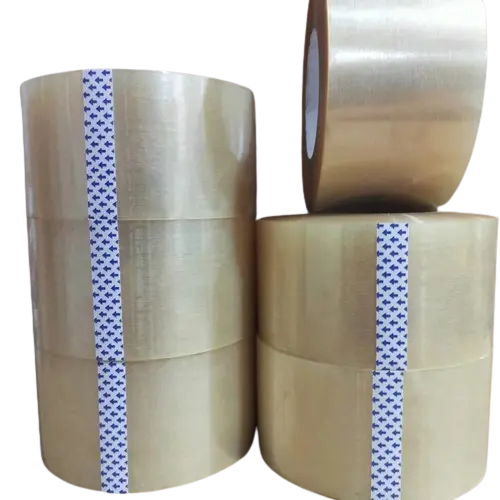Biodegradable Tape

Descrição do produto
Biodegradable Parcel Tape
KEDE New Material 's Biodegradable Tape is a testament to our commitment to sustainability. Offering robust adhesion, this tape biodegradable stands out for its ability to decompose naturally, making it a responsible choice for your packaging needs without compromising on performance.
Biodegradable Tape List KEDE New Material Offer
Biodegradable Sealing Tape
Degradable Printing Tape
Degradable Stationery Tape
Biodegradable Vegetable Strapping Tape
KEDE New Material's Biodegradable Tape: An Eco-friendly Manufacturing Process
Biodegradable wrapping tape is made using a process that involves the use of eco-friendly materials and sustainable manufacturing methods. Here's a general overview of how it's made:
Materials: The primary material used in biodegradable sticky tape is cellulose, a natural polymer derived from plant fibers, primarily wood pulp. KEDE New Material also use other biodegradable materials like polylactic acid (PLA), a bioplastic derived from renewable resources like corn starch or sugar cane.
Adhesive: The adhesive used in eco friendly sticky tape is typically made from natural rubber or other plant-based materials. It's designed to break down naturally over time, just like the tape itself.
Manufacturing Process: The cellulose or PLA is processed into a thin, transparent film. This involves dissolving the material in a suitable solvent, then spreading it out into a thin layer and allowing the solvent to evaporate.
Applying the Adhesive: The adhesive is then applied to one side of the film. Biodegradable adhesive tape from KEDE New Material can be produced using a variety of methods, including coating, spraying, and lamination.
Drying and Cutting: After the adhesive is applied, the tape is dried to ensure the adhesive sets properly. It's then cut into the desired widths and wound onto rolls.
Quality Control: The finished rolls of tape are inspected for quality, ensuring they meet the necessary standards for strength, adhesion, and biodegradability.
Packaging: Finally, the rolls of tape are packaged (often using eco-friendly packaging materials) and prepared for shipping.
It's important to note that the exact process can vary depending on the specific type of biodegradable tape and the manufacturer's methods of packaging tape wholesale.
The Impact of Biodegradable Tape on Waste Management
Biodegradable tape has a significant positive impact on waste management in several ways:
Reduced Landfill Waste: Traditional tapes, made from plastic and other non-biodegradable materials, can take hundreds of years to decompose in a landfill. Biodegradable packing tape, on the other hand, breaks down much faster, reducing the volume of waste that ends up in landfills.
Lowered Environmental Impact: As biodegradable tape decomposes, it doesn't release harmful chemicals into the environment, unlike some traditional tapes. This makes the tape biodegradable a more environmentally friendly option.
Improved Recycling Processes: paper tape compostable can be composted, which is a form of recycling. This not only reduces waste but also helps to enrich soil, promoting plant growth.
Reduced Energy Consumption: The production of traditional tapes often requires a significant amount of energy, much of which comes from non-renewable sources. The production of tape biodegradable, however, typically requires less energy, which can further reduce its environmental impact.
Promotion of Sustainable Practices: The use of paper tape eco friendly can encourage businesses and consumers to adopt more sustainable practices. This can lead to increased demand for other eco-friendly products, further improving waste management.
Compliance with Regulations: In some areas, regulations are being put in place to reduce the use of non-biodegradable materials. Using biodegradable packaging tape can help businesses comply with these regulations, avoiding potential fines and penalties.

